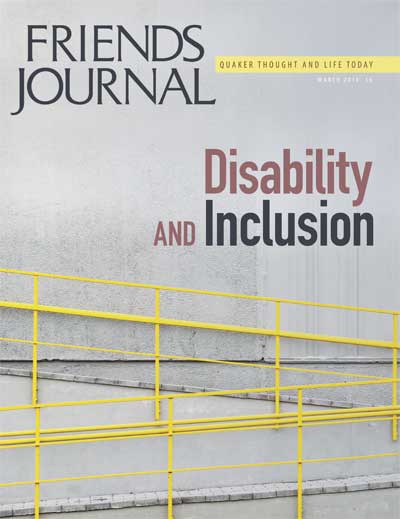
FJ PODCAST SUBSCRIPTION: ITUNES | DOWNLOAD | RSS | STITCHER
“Does anyone belong to a faith community where everyone can hear everything when the community gathers?” I asked this question in a group of non-Quaker colleagues at one of our regular Tuesday meetings. “I do,” said Pam, beaming.
I have become increasingly deaf since moving to Fairfax County, Virginia, in 2004. Almost immediately after moving, I transferred my membership from Albuquerque (N.M.) Meeting to Langley Hill Meeting in McLean. As my hearing impairment worsened, I purchased state-of-the-art hearing aids. Eventually, I supplemented those with a Williams Sound system of microphone-plus-headphones that worked well in small group settings where people were willing to pass the small microphone, or gather close to it and speak loudly and succinctly.
But in my Friends meeting at large, I had grown increasingly isolated. In spite of our overhead mics and our headsets for hearing-impaired members and attenders, I could not hear messages in meetings for worship or follow what was said at any other time in our meetingroom. We had a committed task force looking into possible improvements, but each year I was becoming more resigned to very little participation in our corporate body. In contrast, each year at Baltimore Yearly Meeting’s annual conference, I was able to hear our many reports and discussions. The microphone was passed from hand to hand as needed.
What I remember about Pam’s response is that she used the word “lovingly” at least three times. Pam goes to a church that has between 100 and 200 attenders. The following is approximately what she said:
A member of our church researched the sound systems available. When there is any sort of meeting or group interaction in the sanctuary, people take turns being in charge of lovingly handing the mic to the person who wishes to speak. When that person is finished, the volunteer lovingly takes the mic back and lovingly gives it to the next person who wishes to speak. Anyone who has trouble hearing wears a headset that is connected to the sound system.
Pam gave me Alan’s contact information, and I passed it on to Doug Neal, the most active member of our little task force. But it seemed in the weeks that followed that perhaps no effective changes were going to occur.
The next step I took was to ask a dear Friend to have lunch with me. I was struggling with how “pushy” I wanted to be about what seemed to be only my own needs. Many Friends seemed oblivious to my isolation or slightly annoyed when I asked them to speak up, especially when I repeated that request. This experience of marginalization has taught me so much about my own non-inclusive behavior. My mother has been dead for 20 years, but I continue to recall those many times she sat with us at dinner or other family gatherings and we accepted her non-participation as though it didn’t matter that this brilliant, witty, loving person was no longer a full participant in our lives.
As I told Anne the story of my interaction with Pam, and especially about the use of that word “lovingly,” I found myself tearing up. In the warmth of Anne’s presence, I allowed myself to cry. I asked her if she thought I was asking too much of our meeting to go all out for the inclusion of the most hearing-disabled among us. Could we move past our apparent resistance to solving the problem? Anne’s answer to whether I was being too pushy was a quietly resounding no.
The next day was First Day (in more ways than one). We were having an after-meeting threshing session to address an issue of corporate concern. I had not planned to attend since I knew I wouldn’t be able to hear.
I don’t know by what magic our meeting so quickly transformed itself. I know now that Doug had been laying more groundwork than I had realized. Anne’s husband, Tim, was clerking the session. Anne had a microphone in hand. They explained that anyone wishing to speak out of the silence should stand and wait for the mic.
I was not the only person there who felt deep gratitude for this day. The microphone was lovingly brought to each of us who spoke. Not only were the hearing-impaired thereby included, but everyone became more fully connected to the body of all of us. We belonged to each other.




Dear Maryhelen and Fellow Quakers
This is a beautiful and pertinent Love Story. I only have the very slightest loss of hearing yet I find myself asking, not during Meeting, but at notices after Meeting, for Friends to speak up.
I know that when I come to give Ministry sometimes my voice is hardly there. It seems to be the nature of Ministry that it is given humbly and gently and therefore it may not be heard well.
I have been a teacher have a good carrying voice and when I give notices after Meeting. I am sure that I can be heard.
If a microphone is given lovingly then it allows the gift of Ministry to be heard by all.
Thank you for this thoughtful, helpful article.
Deborah Williams from Christchurch MM, Aotearoa New Zealand at present in Scotland
I have long believed that Louis Cox’ feature in Friends Journal addressed this matter extensively and extremely well. https://oldfj.wpengine.com/friend-heard/
Thank you for linking this article from facebook. May all Friends’ Meetings include the hearing impaired in this way.
I first noticed my gradually worsening hearing about the time I started attending Philadelphia Yearly’s Interim Sessions at the Meetinghouse at 4th and Arch .. where the microphone was lovingly passed by Young Friends. Many Monthly meetings I attended had the antiquated overhead microphone/headset which did not help me, either.
Once I could hear Friends’ messages during monthly and quarterly worship if they were teachers or singers or those trained as public speakers who projected their voices .. and do not softly whisper their messages to the floor .. the most common manner of Friends who feel led to speak.
With courage gained from Maryhelen Snyder story she shared in her “Love Story”, perhaps I can again become active with my faith family.